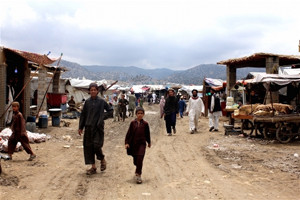By Catherine James
The United States has allocated $950 million for assisting Afghan refugees and returnees, but much of that money has been lost to corruption while those in need remain in dire conditions.
That’s just one finding in a scathing report released today by the Special Inspector General for Afghanistan Reconstruction (SIGAR), which has been tasked by Congress with auditing and investigating the effectiveness of $110 billion directed to Afghanistan for relief and reconstruction projects since 2002.

The growing permanence of the Golan refugee camp in Afghanistan's Khost province can be seen in the bazaar that has sprung up in the camp, seen here on 12 May 2015. (Photo: Catherine James/IRIN)
The report cites a 2013 assessment of a land distribution program run by the Ministry of Refugees and Repatriation (MORR), which found that it was “afflicted by institutional corruption”.
“The assessment also cited bribery, forgery, nepotism, embezzlement, and poor customer service as obstacles to the program’s implementation,” according to the SIGAR report.
Corruption led the US State Department to cut off funding to the ministry, and the UN's refugee agency, UNHCR, to restrict assistance to “mainly non-financial items”, the report said.
Afghan officials acknowledge past corruption but they say the new government, which took power last year, is taking action.
“We have had challenges, troubles, and difficulties in the past. No one can ignore that,” said Sayed Hussain Alimi Balkhi, who was sworn in as minster in early 2015.
“But we have started to fight against corruption here, and to put measures in place that hopefully will be acceptable for those such as the international NGOs and partners, especially the UNHCR and the IOM (International Organization for Migration), and observers like the media who look at our work,” he told IRIN.
Rohullah Hashimi, an adviser to the MORR, said the ministry has established a commission aimed at fighting corruption and measures will include replacing staff who are found to have engaged in corrupt practices.
The SIGAR report noted that Afghanistan’s new government has “expressed its commitment to addressing refugee integration needs and dealing with capacity and corruption issues within the MORR, but it is too soon to tell how effective its efforts will be.”
Here are some key findings included the SIGAR report:
• Due to MORR’s mismanagement of a land allocation program, only 38,000 of the 266,000 families that applied were given plots and only 9,200 were able to move onto their land.
• In 2012, Afghanistan adopted a “solutions strategy” aimed at providing returnees with a “minimum standard of living”, including livelihood opportunities. But the MORR failed in “identifying the needs of returnees in areas of high return and communicating those needs to other ministries”.
• A high-ranking Afghan government official stated that “refugees do not get much attention because they are not a priority issue and ministries do not think refugees are directly related to their work”.
• The US State Department funded a program led by IOM aimed at building capacity within the MORR. Before the program ended in 2014, IOM restricted it to provincial offices citing an “extremely challenging” relationship under the minister at the time. When the program ended, the State Department did not extend it, because of ongoing capacity and corruption issues.
• The MORR was found to have “misappropriated approximately $117,000 in UNHCR funds for staff bonuses, reimbursements to officials supported by forged documents, and an office rental that included conditions in direct contravention of UNHCR rules and Afghan laws”.



